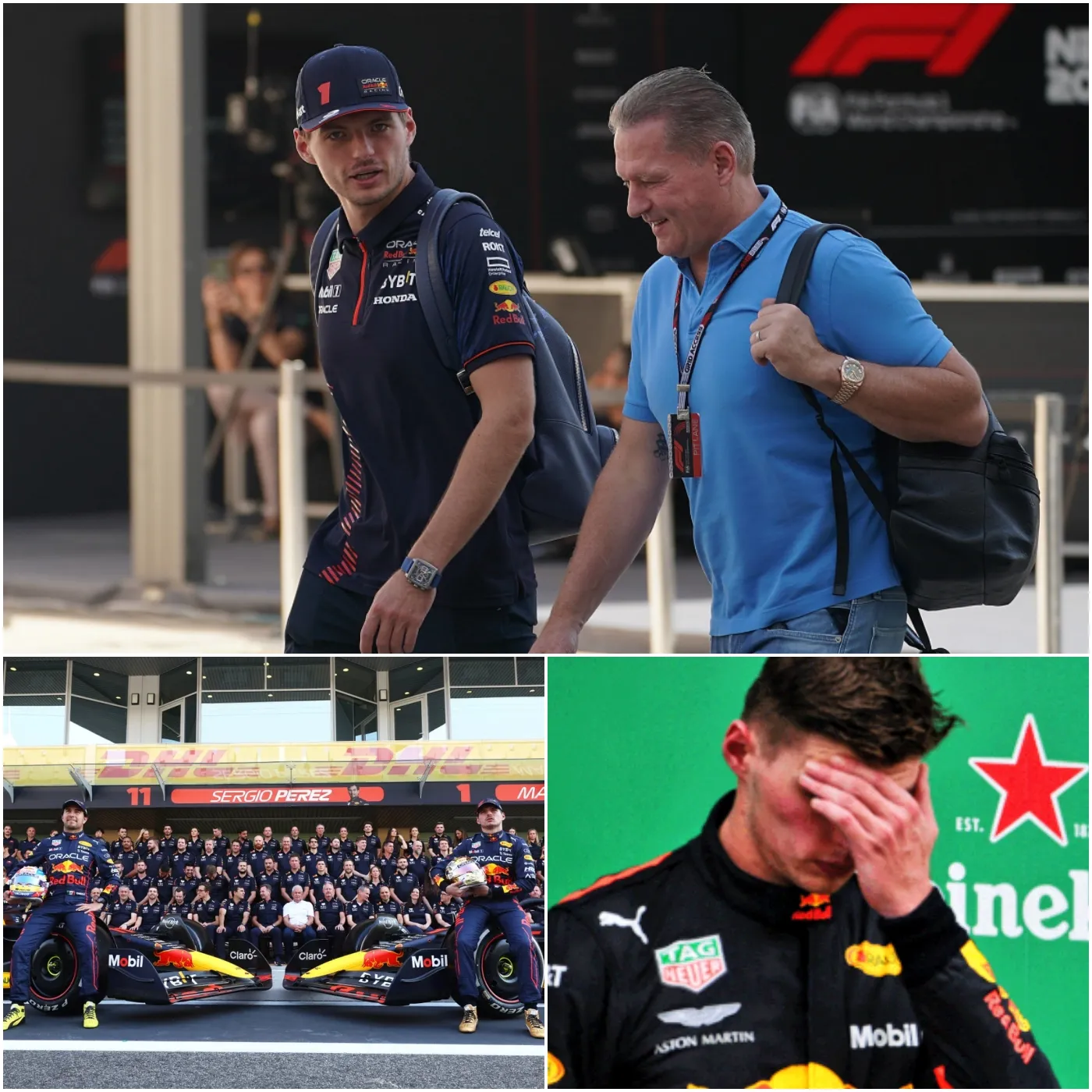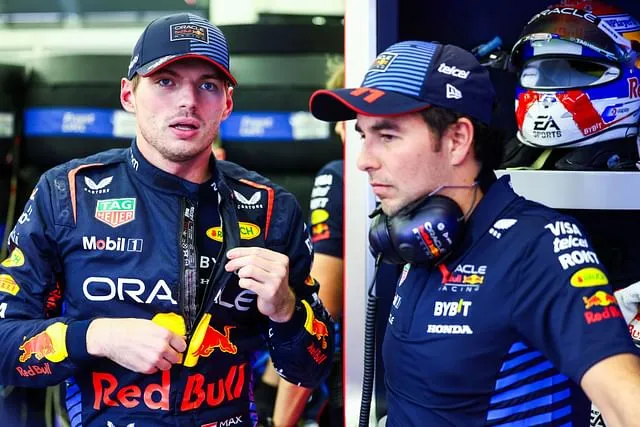

Max Verstappen’s Family Thinks the Media Is Rigged—Do They Have a Case or Just Thin Skin?
In the world of Formula 1, controversies abound like pit stops during a race. One of the latest to rev up the drama is Johnny Herbert, a former F1 driver turned commentator, who has found himself embroiled in a heated exchange with the Verstappen family. The accusations? That he was a biased steward during his time at the FIA. Buckle up, because this article is about to take you on a wild ride through the twists and turns of this ongoing saga, complete with humor, controversy, and a sprinkle of victimhood.
The Background: Who is Johnny Herbert?
Before delving into the controversy, let’s set the stage. Johnny Herbert is not just any former driver; he’s a man who has lived and breathed F1. With a career spanning over a decade, he raced for teams like Benetton and Jaguar and even clinched three Grand Prix victories. After hanging up his racing gloves, he transitioned into a role as a pundit and analyst, sharing his insights with fans around the globe.
But despite his illustrious career, Herbert is now facing accusations that could tarnish his reputation. The Verstappen family, particularly Max and his father Jos, have been vocal about what they perceive as a bias in F1 media and governance. And guess who’s caught in the crossfire? That’s right—Johnny Herbert.
The Accusations: Bias from the Verstappen Family
The root of this controversy can be traced back to the Verstappen family’s ongoing claims that the British media and stewards exhibit a bias against non-British drivers, particularly Max Verstappen. It’s a narrative that resonates with many fans but has also drawn the ire of others, including Herbert.
“The Verstappens keep intimating there’s bias,” Herbert stated, clearly frustrated. “I keep reading about the supposed bias. I read that and then wonder, ‘So I can’t support a British driver because I’m British? I can’t support Lewis or George or Lando? It’s ridiculous.’”

The Emotional Rollercoaster
Herbert’s comments reveal the emotional rollercoaster that F1 pundits often ride. On one hand, they are passionate about the sport; on the other, they are subjected to scrutiny from fans and drivers alike. When you’re in the public eye, every statement is dissected, and every opinion can become fodder for controversy.
But is it really fair to label Herbert as biased simply because he supports British drivers? This raises an interesting question: Can nationality influence objectivity in sport analysis?
The Double Standards: A British Perspective
Herbert isn’t just playing the victim; he’s also calling out what he perceives as double standards in the treatment of British and Dutch drivers. “But coming the other way is fine apparently,” he quipped. “If you’re a Dutchman, you can sort of have a go at the Brits and say the Brits have got no real morals for how they are as race fans. It’s supposed to go both ways, isn’t it?”
This comment is likely to ruffle some feathers, especially among die-hard Verstappen fans who feel that their driver is often unfairly treated. But Herbert’s frustration is palpable. He’s essentially asking why it’s acceptable for Dutch fans to criticize British drivers while he faces backlash for supporting his countrymen.
The Fan Divide: British vs. Dutch
The divide between British and Dutch fans has become increasingly apparent, particularly with the rise of Max Verstappen as a dominant force in F1. British fans are fiercely loyal to their drivers, such as Lewis Hamilton, George Russell, and Lando Norris. Meanwhile, Dutch fans cheer passionately for Verstappen, creating a rivalry that adds spice to the already thrilling sport.
As the tensions rise, so do the accusations. It’s a classic case of “he said, she said,” where both sides feel wronged and misunderstood. The question remains: can both sides coexist without resorting to name-calling and finger-pointing?
The Humor in the Situation
Let’s take a moment to inject some humor into this serious debate. Picture a press conference where Herbert is asked about his bias. “So, Johnny, do you support British drivers because you’re British, or do you just really love tea and crumpets?”
Or imagine a fictional F1 reality show where drivers must declare their national allegiance before each race. “I, Max Verstappen, hereby renounce my Dutch citizenship in favor of supporting… the British drivers!”
These absurd scenarios serve to highlight the ridiculousness of the ongoing debates about bias. F1 is supposed to be fun, and the rivalries should be taken with a grain of salt—or perhaps a whole shaker!
The Media’s Role in the Bias Debate
The media plays a significant role in shaping narratives in F1. British media outlets often focus on their homegrown talent, which can lead to perceptions of bias among international drivers. Herbert’s comments underscore the challenges of navigating this complex landscape.
When a British driver performs well, it’s often celebrated in the media, while a non-British driver may not receive the same level of attention, regardless of their accomplishments. This disparity can fuel resentment and accusations of bias, particularly from passionate fans who feel their drivers are being slighted.
Social Media Amplification
In today’s digital age, social media amplifies these sentiments. A single tweet or Facebook post can spark outrage and ignite debates that spiral out of control. Herbert’s comments and the Verstappen family’s accusations have led to a flurry of online discussions, often filled with sarcasm and vitriol.
Fans from both sides engage in back-and-forth exchanges that can quickly devolve into name-calling. “You’re just jealous because Verstappen is better!” versus “You’re biased because you only support British drivers!” It’s like a never-ending game of Twitter tennis, with no clear winner in sight.
The Bigger Picture: Nationality and Identity in F1
While the controversy surrounding Herbert and the Verstappens is intriguing, it’s essential to recognize the broader context. Nationality plays a significant role in F1, impacting everything from fan loyalty to media coverage.
The Importance of Rivalries
Rivalries are the lifeblood of F1. They create drama, excitement, and buzz that keep fans on the edge of their seats. The tension between British and Dutch fans adds an extra layer of intrigue to the sport. It’s a classic “us versus them” scenario that fuels passion and loyalty.
However, these rivalries can also lead to toxic environments where accusations of bias and unfair treatment become commonplace. The challenge lies in enjoying the sport while respecting the achievements of all drivers, regardless of nationality.

The Future of the Debate
As the 2023 F1 season rolls on, the debate surrounding bias in media and support is unlikely to fade away. Herbert’s comments have reignited discussions about what it means to be a fan and how nationality influences our perceptions.
A Call for Understanding
In these tumultuous times, it may be worth considering a call for understanding among fans. Instead of pitting British and Dutch fans against each other, why not celebrate the incredible talent that both sides bring to the sport?
Imagine a world where British and Dutch fans unite to cheer for their favorite drivers, regardless of nationality. It’s a utopian vision, but one that could help foster a more inclusive and harmonious F1 community.
The Humble Pundit
As for Johnny Herbert, he may need to embrace his role as the “humble pundit” in this debate. Perhaps he could take a step back and recognize that his support for British drivers doesn’t diminish the accomplishments of non-British drivers.
Acknowledging the merits of all drivers, regardless of nationality, could go a long way in mending fences and reducing the perception of bias. After all, F1 is about speed, skill, and sportsmanship—values that transcend borders.
Conclusion: The Race Goes On
In the end, the debate surrounding bias in F1 media is as complex as the sport itself. Johnny Herbert’s comments have brought to light the nuances of national pride, media coverage, and fan support. While it’s easy to play the victim and point fingers, it’s essential to recognize that bias exists on all sides.
As the 2023 F1 season continues to unfold, fans can expect more drama, more rivalries, and perhaps even more accusations of bias. The key takeaway? In the world of Formula 1, everyone has their favorite drivers, and that’s what makes the sport so thrilling.
So, let’s rev up our engines and enjoy the ride—because in the end, we’re all just fans of this incredible sport we love. And who knows? Maybe one day we’ll look back at this controversy and laugh, realizing that it was all part of the thrilling spectacle that is Formula 1.


















